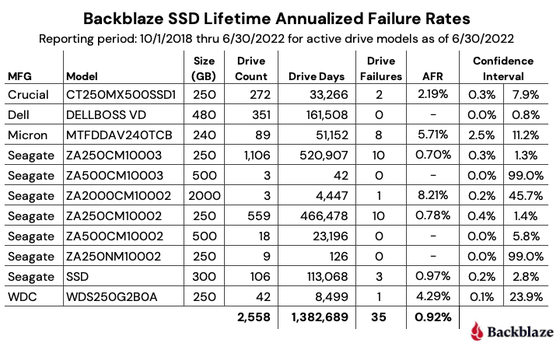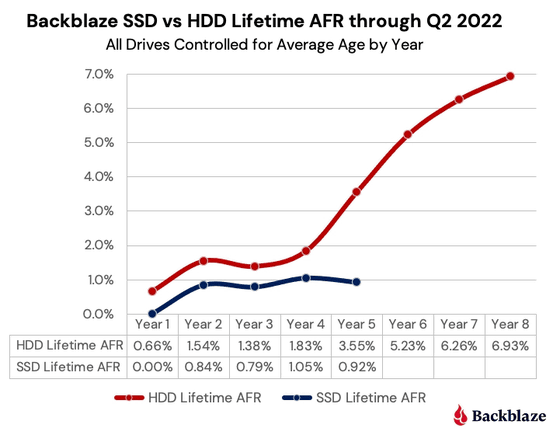Backblaze publishes statistical data ``Statistical data by manufacturer/model 2022 mid-term review SSD version'' summarizing the failure rate of SSD

The SSD Edition: 2022 Drive Stats Mid-year Review
https://www.backblaze.com/blog/ssd-drive-stats-mid-2022-review/
The 2022 mid-term review SSD version of statistical data by manufacturer and model published by Backblaze is data based on SSDs used as boot drives for storage servers in the company's cloud storage platform. Backblaze measures the failure rate of these SSDs `` quarterly '' or `` the entire period from the start of use '', and also compares performance with HDDs that are also used as boot drives. Backblaze's boot drive not only boots the storage server, but also stores log files and temporary files generated by the storage server. It says it's running.
Below is a table summarizing the failure rate of SSDs operated by Backblaze during the period from April 1, 2022 to June 30, 2022 (second quarter of 2022). The total number of SSDs in operation is 2558, and the 'annual failure rate (AFR)' obtained by dividing the total number of failed SSDs by the number of years the SSD has been used is '1.15%'. There are 11 types of SSD models operated by Backblaze in total, of which failures occurred Micron's 'MTFDDAV240TCB' (240GB model), Seagate's 'ZA250CM10003' (250GB model), Seagate's 'ZA250CM10002' ( 250GB model) only 3 models. 'MTFDDAV240TCB' has 1 failure out of 89 in operation, 'ZA250CM10003' has 2 out of 1106 failures, and 'ZA250CM10002' has 4 out of 559 failures Did.

On the other hand, the table below summarizes the failure rate of SSDs operated by Backblaze during the period from January 1, 2022 to March 31, 2022 (first quarter of 2022). The total number of operated SSDs was 2373, and the AFR was '1.23%'. Although the number of failures is the same as the second quarter of 2022, '7', the number of SSDs in operation was higher in the second quarter of 2022, so the AFR decreased slightly in the second quarter. In addition, Seagate's 'ZA 250 CM 10003' (250 GB model), Seagate's 'ZA 250 CM 10002' (250 GB model), three models of Seagate SSD with unknown model name.

Among the SSDs operated by Backblaze, Dell's 'DELLBOSS VD' and Micron's 'MTFDDAV240TCB' are M.2 standard SSDs, but all others are standard 2.5-inch SSDs.
Backblaze has released a report summarizing SSD failure data until the fourth quarter of 2021, but after the aggregation period of this report, 192 Crucial 'CT250MX500SSD1' and DELL's 'DELLBOSS VD' will be used as new SSDs. 101 units and 42 units of WDC's 'WDS250G2B0A' have been added. In previous reports, Crucial's 'CT250MX500SSD1' had a high failure rate, but in 2022, when more of the same model was introduced, not a single unit broke down at the end of the second quarter.

The table below summarizes the failure data from Backblaze's start of SSD operation on October 1, 2018 until June 30, 2022. The notation in the table is 'Drive Count' (number of operations), 'Drive Days' (cumulative number of days of use), 'Drive Failures' (number of failures), 'AFR' (annual failure rate), 'Confidence Interval' ( confidence interval ) pointing to Backblaze says, ``In general, the more data and the more consistent the data, the more confidence you have based on that data. However, just because the confidence interval is wider than 1.0% does not mean that the model is problematic. We want to produce more reliable data.”

Backblaze's SSD with a ``confidence interval width of 1.0% or less'' is DELL's ``DELLBOSS VD'', Seagate's ``ZA250CM10003'' (250GB) and ``ZA250CM10002'' (250GB). DELL's 'DELLBOSS VD' is an M.2 standard server-class SSD, and the selling price is very high at over $ 450 (about 65,000 yen), so it is 'not for general consumers' Backblaze . On the other hand, Seagate's 'ZA250CM10003' (250GB) and 'ZA250CM10002' (250GB) are SSDs for general consumers, and the selling price is about 45 dollars (about 6500 yen), which is a relatively affordable price range.
Backblaze started operating SSDs in 2018, and the AFR this time, which is the fifth year, is '0.92%'. The graph below summarizes AFR since Backblaze started operating HDD and SSD. AFR is clearly lower for SSD than for HDD.

With this result, Backblaze said, ``We can reasonably argue that SSDs are more reliable than HDDs, at least when used as boot drives in our environment. These results support anecdotes and educated guesses.
Related Posts:
in Hardware, Posted by logu_ii






